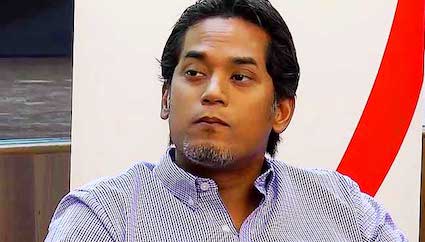Khairy: Ratifying anti-discrimination UN treaty contradicts Malay special position

(MMO) – Rembau MP Khairy Jamaluddin questioned today the prime minister’s promise to ratify core United Nations (UN) conventions relating to human rights, saying an anti-discrimination treaty contradicted the constitutional special position of Malays.
Speaking at the Dewan Rakyat today, the Umno lawmaker pointed out that Article Two of the UN International Convention on the Elimination of All Forms of Racial Discrimination calls for an end to all racial discrimination, which runs contrary to Article 153 of the Malaysian Federal Constitution that safeguards the “special position” of the Malays and natives of Sabah and Sarawak.
“In the context of the Malaysian government, the prime minister has said Malaysia will ratify all core UN conventions relating to human rights. I just want to know what is the implication on our laws and policies?
“Wisma Putra had a concrete reason why we did not ratify some of these conventions — particularly the UN International Convention on the Elimination of All Forms of Racial Discrimination’s Article Two,” said Khairy.
Article Two (2) of the UN convention demands: “States Parties shall, when the circumstances so warrant, take, in the social, economic, cultural and other fields, special and concrete measures to ensure the adequate development and protection of certain racial groups or individuals belonging to them, for the purpose of guaranteeing them the full and equal enjoyment of human rights and fundamental freedoms.
“These measures shall in no case entail as a consequence the maintenance of unequal or separate rights for different racial groups after the objectives for which they were taken have been achieved.”
The former minister had argued that Article 153 of Malaysia’s Federal Constitution clearly grants special status to one ethnic group (the Malays), which runs contrary to the UN convention’s requirement which grants only a specific time frame until the minority’s status has been elevated.
“Do we realise the implications on our policy? We did not ratify this with good reason because it was in line with our Federal Constitution granting special privileges to an ethnic group. The impact on (ratifying) this international convention is that we must enforce this as a law.
“Does this mean Article 153 of the Federal Constitution will have a time frame because the convention clearly states that any forms of positive discrimination for a minority must have a time frame? However, this does not mean I agree or disagree with it,” said Khairy during his debate.
Later, Tanjong Malim MP Chang Lih Kang (PKR) questioned Barisan Nasional’s (BN) stance over the ratification process, saying the former government as well as Khairy did not have the courage to make the change, unlike the current Pakatan Harapan (PH) government.
The Rembau MP stood up and challenged Chang, and asked instead if he has the courage to take a stand and change Article 153 of the Federal Constitution.
Chang said that Prime Minister Tun Dr Mahathir Mohamad had allowed free debate on the matter and he agreed to ratify the convention, but Khairy continued pressing Chang, asking whether he agreed to abolish Article 153.
“I agree that there should be a discussion on this matter but does Tanjong Malim agree? Does His Honourable agree that it (Article 153) should be taken out of the Federal Constitution? Do you agree on ratifying if there’s an impact on the Federal Constitution?” Khairy pressed Chang.
Chang replied that he agreed with the ratification of the UN treaty, but there must be a discussion on the impact of the action.
During his winding-up session, Foreign Minister Datuk Saifuddin Abdullah told Khairy that although ratifying Article Two of the convention will face a lot of reservation and might not even succeed, at the very least the government has taken a step forward.
“I have joked with the technical committee that maybe we should change their name to the ratification committee so they will stop finding technical reasons on why we shouldn’t ratify something.
“At the very least, we can discuss the issue instead of not trying. On Article 153 of the Federal Constitution, we have stretched it to include almost everything under the sun. If that is what we do, we will never ratify.
“We shouldn’t find excuses not to ratify but find ways to ratify. However, if there are reservations to ratify, at the very least, we have made a move towards ratification,” said Saifuddin.
Khairy said it was unfair of Saifuddin to say the BN government did not make any effort to ratify Article 2. He said the reason behind it was due to the special Malay rights enshrined in the Constitution.
He predicted that the current administration will face the same issue regarding the ratification of Article Two of the UN convention.
Batu Kawan MP P. Kasthuriraani (DAP), on the other hand, wanted Malaysia to sign and ratify even the UN Declaration on the Elimination of All Forms of Intolerance and of Discrimination Based on Religion or Belief — which would allow total religious freedom.
She questioned how Malaysia can champion human rights on an international level when the nation still falls under Tier Two of the United States Commission on International Religious Freedom (USCIRF).
“When it comes to freedom of religion and belief, the usage of ‘Kalimah Allah’ and ownership of religious materials (is still an issue). It is a sensitive issue but the minister did say we must start from home,” said the Penang lawmaker.
“How can we be defenders and promoters of human rights in other countries (if we have not resolved this at home)? The Pakatan Harapan government must be a signatory (on this convention).
“Among the recommendation under USCIRF include abolishing the Sedition Act which is used as a weapon to shut the mouths of Malaysians on religiously sensitive issues — used to arrest Shi’ites and Bahai — whereas the Federal Constitution allows other religions to be practised here,” she said.

